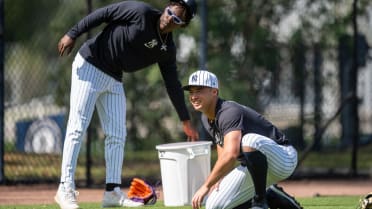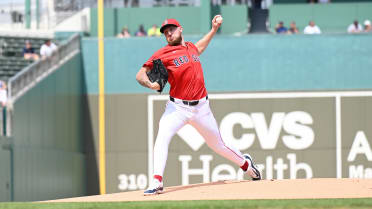This Seaver is terrific too: No. 10 overall pick forging remarkable path
Just to put this important issue to bed, Seaver King says he was not named after the legendary Tom Seaver, as had been reported and speculated in a few places as he rose to prominence on MLB Draft boards in the past year.
“I think I was supposed to be a girl, and they had something picked out,” King says of his parents. “And then I wasn’t, so they had to pivot.”
A nominative connection to a Hall of Famer would seemingly make for a great story. But then again, it would not be representative of the skillset that has put this Seaver, who starred at third base, shortstop and center field for Wake Forest in 2024 before being drafted No. 10 overall by the Nationals, on the professional map.
“[Tom Seaver] was a pitcher,” King says with a smile. “I don’t really care about those guys too much.”
2024 Draft presented by Nike:
Draft Tracker | First-round signings | All-time biggest bonuses
Pick-by-pick analysis: Day 1 | Day 2 | Day 3
Bazzana goes No. 1 | Wake Forest makes history | Mariners nab switch-pitcher | Top 7 Day 1 storylines | Best hauls | Our favorite picks | Famous family ties | Biggest steals | These picks could be new club No. 1's | Picks who could be quickest to bigs | Sons of Manny, Big Papi selected | Complete coverage
A more proper pairing, if the loftiest hopes and projections for the 21-year-old King come to fruition, might be with a likely future Hall of Famer in Mookie Betts.
That’s a player King loves to watch and a player with whom he has been compared at this nascent stage of his professional career.
Those comparisons are made because King (6-foot, 195 pounds) and Betts (5-foot-9, 180 pounds) are built similarly, offer incredible athleticism and important positional versatility and a beautiful blend of power and speed. They are both blessed with the bat speed to generate far more thump than their frames would suggest.
But another comparison that can be made between King and Betts is that they were both undervalued at a particular point in their path to the pros. Teams didn’t pay them proper mind at the end of their prep careers.
Betts was famously passed over for four full rounds of the MLB Draft when coming out of Nashville’s Overton High School. But at least he was on the radar of big league teams and Division I programs.
With King, the snub was steeper. Undersized and therefore overlooked (despite being selected First Team All-State out of Georgia’s Athens Christian School), King wasn’t recruited at all by DI teams, landing instead at DII Wingate. There, he put on about 20 pounds and put on a show, including a 47-game hitting streak that was just seven shy of a DII record held by Kevin Pillar.
More from MLB Pipeline:
• Top 100 prospects | Stats | Video | Podcast | Complete coverage
King might have broken that record, which was still intact as of the end of his sophomore year, had Wake Forest not come calling. For King, the elevation to the ACC proved not to be a statistical impediment. He added to his power profile, bashing out 16 homers, which was one more than he had hit in his two seasons at Wingate combined.
But what’s most impressive is that the power was paired with a 12 percent strikeout rate.
“I’m what you call a swinger, so I like to swing a lot,” King says. “But I’m also comfortable with two strikes to where I’m not gonna strike out. I got more used to college baseball and approach, and I think that’s why the power numbers ticked up and why the strikeout numbers stayed down. That’s just always been my identity of not striking out and improving the damage I can do when I am ahead in the count.”
King did so much damage at Wingate that he became the rare DII player to be selected for the collegiate national team. And he did so much damage for the Demon Deacons that he became a prominent Draft prospect.
What he loves about the game, though, is the ability to keep going and keep growing.
“You’re never going to be the best,” he says. “There’s always room for you to get better as a player and as a person. It’s one of the only sports where there’s not [a clear] best player ever. There’s always an argument. So I love the difficulty of it and how you can get better every day.”
King is living proof of how much a player can improve and raise his profile in a relatively short window of time. And while his first name might be one that conjures up strong memories and emotions in the baseball world, Seaver King doesn’t need an actual connection to the Seaver that preceded him. He’s doing a fine job so far of making a name for himself.
Anthony Castrovince has been a reporter for MLB.com since 2004.




